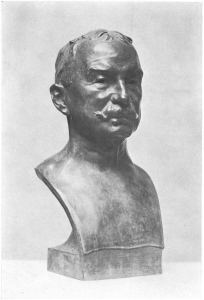“He will not be forgotten we live who knew him and loved for all time, in whatever of beauty there may be in American character, there will remain the spirit and service of Francis Millet – Elihu Root.

Art & Progress, James Hunt Shortly after the Chicago Fair Mr. Millet went to England, where he remained four or five years. We corresponded and kept in close touch with one another. In 1898 he went to Manila as correspondent in the Spanish-American War for Harper’s Weekly and the London Times. I saw him at brief intervals; after the Philippines he went to Paris to decorate the American pavilion at the Paris Exposition of 1900; masterpiece for the Baltimore Custom House, I was constantly in communication with him; I was intensely interested in ships and shipping, and he knew it. When the 12 work was completed and hung he wrote me. I made up my mind to visit him in Washington and go on to Baltimore to see the work. On May 29, 1910, I met Mr. Millet at the Cosmos Club, and he went on to Baltimore with me and gave me that whole day. I thought I had some conception of the work from small photographs and letters I had received from him. But I shall never forget the impression …
Such are the words by James Hunt, a close friend and associate of Francis Davis Millet, that open the second half of a two part article for Art & Progress magazine about Millet and his work to prepare the 1893 World’s Columbian Exposition and then some of Millet’s other commissions and contributions. The following link is to Part II of the story:
https://www.jstor.org/stable/20560995
Millet at Work. A Chronicle of Friendship. Part II: After the World’s Fair Author(s): James Hunt Source: Art and Progress, Vol. 5, No. 1 (Nov., 1913), pp. 12-18 Stable URL: https://www.jstor.org/stable/20560995 Accessed: 13-09-2018 18:05 UTC